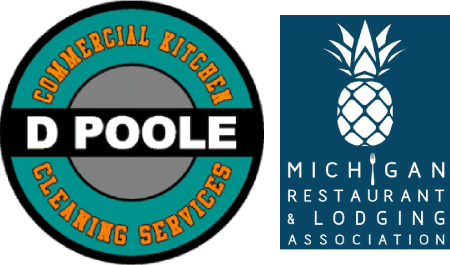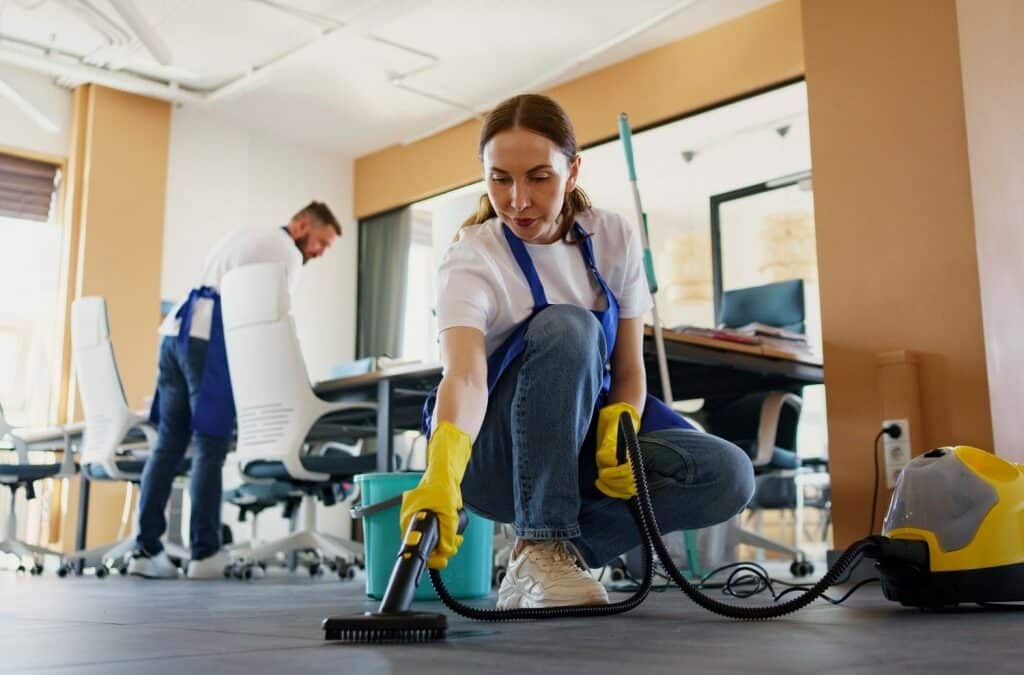Schools are where young minds grow, but they’re also where germs spread fast. Every day, hundreds of students walk the same hallways, eat in the same cafeterias, and use the same restrooms. Floors get slippery. Kitchens build up grease. Restrooms never stay clean for long.
What many don’t realize is how quickly small hygiene lapses turn into big problems. A sticky cafeteria floor may not seem like a crisis… until parents start noticing. A faint gym odor may not get mentioned right away… until it becomes a regular complaint. One overlooked detail can quietly chip away at a school’s reputation long before anyone sounds the alarm.
When a campus starts to feel less clean than it looks, students pick up on it. Staff sense it. Visitors notice it. And that’s when the tough questions begin.
So how do schools stay ahead of the problem before it becomes a headline? How do they protect their reputation without draining already tight budgets? And what’s hiding in plain sight that most campuses miss?
Read on as we uncover the overlooked hygiene hotspots, the silent costs of “good enough” cleaning, and why professional commercial cleaning in Lansing plays a bigger role than most administrators realize.
When Cleanliness Quietly Becomes a Reputation Problem
No school wants to be known as “the one that smells like the gym.” No university wants parents whispering about grimy cafeterias during campus tours. Yet that’s often how reputation issues start. Not with a scandal. Not with a major incident. But with the subtle, day-to-day signals of neglect that no one addresses soon enough.
Cleanliness is the first thing people feel before they process anything else. Parents might not comment, but they make quiet judgments. Students might not complain directly, but they internalize the environment around them. It affects how they treat the campus, how they behave, and even how they learn.
When schools rely on minimal cleaning routines, they may not notice the slow decline right away. But students, staff, and visitors do.
The Real Trouble Spots No One Talks About
Most campuses have daily janitorial routines, but some areas need more attention than a quick mop and wipe. These high-traffic zones are often where the biggest problems start:
- Cafeterias and Kitchens: Grease, crumbs, and spills build up in corners that daily cleaning can miss.
- Restrooms: High moisture and constant use create prime conditions for bacteria and unpleasant odors.
- Locker Rooms and Gyms: Sweat, humidity, and shared equipment make these spaces a germ magnet.
- Classrooms: Door handles, chairs, and shared devices spread illness quickly.
- Dormitories and Lounges: When many students share common spaces, small messes multiply fast.
These areas don’t just need cleaning. They need targeted, consistent attention from professionals trained to handle them at scale.
Why “Good Enough” Cleaning Isn’t Actually Enough
Most schools do have cleaning routines in place. But those routines are built to get things “presentable,” not necessarily sanitary. What looks clean to the eye often hides buildup that standard tools and products can’t fully remove.
Over time, that buildup leads to:
- Increased bacterial growth and odor retention
- Higher maintenance costs when flooring and equipment degrade faster
- Negative parent and student perception
- A higher risk of health-related absences
This is why relying solely on surface-level cleaning eventually backfires. What starts as a cost-saving decision turns into a reputation and maintenance cost problem down the line.
Preventative Cleaning: The Quiet Power Move
The smartest campuses don’t wait for complaints. They act before problems are visible. Preventative cleaning is structured, scheduled, and strategically focused on the spaces that affect safety and reputation most.
With a proper cleaning plan, schools can:
- Control bacteria, odor, and allergen levels
- Extend the lifespan of flooring, kitchen systems, and building interiors
- Maintain compliance with health and safety standards
- Reduce the number of emergency cleanups and outbreaks
This approach saves money in the long run and keeps the environment consistently healthy for students and staff.
Why the Cafeteria Sets the Tone
Walk into any campus and the cafeteria tells a story. If it’s clean, the entire space feels safe and well cared for. If it’s not, that single impression can overshadow everything else.
Grease buildup around hoods and vents, improperly sanitized prep areas, or a lingering smell in the dining area can undo months of effort in other departments. Parents and students tend to associate the cleanliness of cafeterias with the overall standard of the school.
That’s why kitchen and cafeteria sanitation is often the first priority in professional commercial cleaning services Lansing MI facilities rely on.
The Link Between Cleanliness and Learning
Clean spaces affect more than appearances. They shape how students feel and behave.
When facilities are well-maintained:
- Students concentrate better and miss fewer days due to illness
- Teachers work in a more positive and productive environment
- Parents trust the institution more deeply
- Visitors leave with a better impression
This is why so many schools are quietly increasing their investment in commercial cleaning Lansing MI institutions can rely on. It’s not just about cleanliness. It’s about improving the entire educational experience.
A Shift Toward Sustainable, Safer Cleaning
Many Lansing schools are also paying attention to how their facilities are cleaned. Eco-friendly solutions are becoming a priority because they support healthier air quality and reduce harsh chemical exposure for students and staff.
This shift includes:
- Using non-toxic cleaning solutions
- Reducing water waste
- Improving air filtration through proper maintenance
- Supporting long-term facility health
Sustainable cleaning isn’t just good for the environment. It’s good for everyone who spends their days inside these buildings.
A Cleaner Campus Is a Smarter Strategy
Did you know that a school’s cleanliness is one of the top factors parents consider when deciding where to enroll their children? First impressions aren’t just about glossy brochures or shiny banners. They’re about how a campus feels the moment someone walks through the door.
Students may not say it out loud, but they feel it every day. Parents sense it during tours and visits. Even the smallest details such as clean hallways, fresh cafeterias, and sanitized restrooms shape how safe and cared for a school community feels.
When your cleaning strategy matches the scale and sensitivity of your campus, you’re not just maintaining a building. You’re protecting your reputation, earning the trust of your community, and creating an environment where learning thrives.
If that’s the kind of impression you want to leave, partner with D Poole Commercial Kitchen Cleaning Services. We help educational institutions in Lansing take that step from “good enough” to exceptional. Schedule a consultation today and see how professional commercial cleaning in Lansing can redefine the way people experience your campus.
Frequently Asked Questions
1. Why isn’t basic daily cleaning enough for schools and universities?
Daily janitorial cleaning keeps spaces looking tidy, but it doesn’t always remove the buildup of bacteria, grease, or deep-seated dirt in high-traffic areas. Places like cafeterias, locker rooms, and restrooms need more than just a surface wipe to stay safe and sanitary. That’s why many campuses turn to commercial cleaning services in Lansing MI to handle the deeper, more specialized work that standard routines often miss.
2. What areas of a school need the most attention during cleaning?
While every corner matters, some areas create bigger problems when neglected. Kitchens, cafeterias, restrooms, and locker rooms are prime hotspots for germs, odors, and moisture buildup. These spaces require structured cleaning to keep bacteria under control and maintain a healthy learning environment. Professional commercial cleaning Lansing services target these zones with proven methods to prevent issues before they escalate.
3. How does professional cleaning help improve a school’s reputation?
Parents and students notice cleanliness before anything else. A clean, fresh-smelling cafeteria or spotless restroom quietly builds trust, while neglected spaces do the opposite. Schools that invest in commercial cleaning in Lansing MI make a strong first impression, which influences how parents view the quality and safety of the institution. Clean campuses build credibility without needing to say a word.
4. Is professional commercial cleaning expensive for schools?
Not having a proper cleaning plan often costs more in the long run. Odor problems, pest issues, flooring damage, and equipment deterioration pile up fast. By investing in a preventative cleaning schedule, schools can reduce costly repairs and emergencies. With structured services from commercial cleaning Lansing providers, schools actually save more over time while maintaining higher standards.
5. How often should a school or university schedule deep cleaning?
The best schedule depends on the size of the campus and how heavily it’s used. Most schools benefit from daily upkeep paired with scheduled deep cleaning for kitchens, restrooms, and common spaces throughout the semester. Regular visits from professional commercial cleaning services in Lansing MI keep facilities consistently fresh and reduce the chance of problems slipping through the cracks.
6. Are eco-friendly cleaning products effective for school environments?
Yes. Eco-friendly cleaning solutions are designed to disinfect effectively without exposing students and staff to harsh chemicals. Many Lansing schools now prefer sustainable cleaning methods to support better indoor air quality and student health. Choosing a commercial cleaning Lansing provider that uses green solutions creates safer spaces without compromising results.
7. How does professional cleaning impact student and staff health?
A clean environment directly affects attendance and overall well-being. Reducing bacteria, mold, and allergens means fewer illnesses and absences. It also boosts focus and comfort for both students and staff. Consistent commercial cleaning in Lansing MI plays a quiet but powerful role in supporting a healthy learning atmosphere.
8. Why should schools choose professional commercial cleaning instead of hiring more janitorial staff?
Campus janitorial teams are essential, but they often focus on day-to-day maintenance. Professional commercial cleaners bring specialized equipment, targeted cleaning protocols, and expertise that go beyond standard routines. Partnering with commercial cleaning Lansing experts gives schools the best of both worlds: regular maintenance and high-level sanitation.

